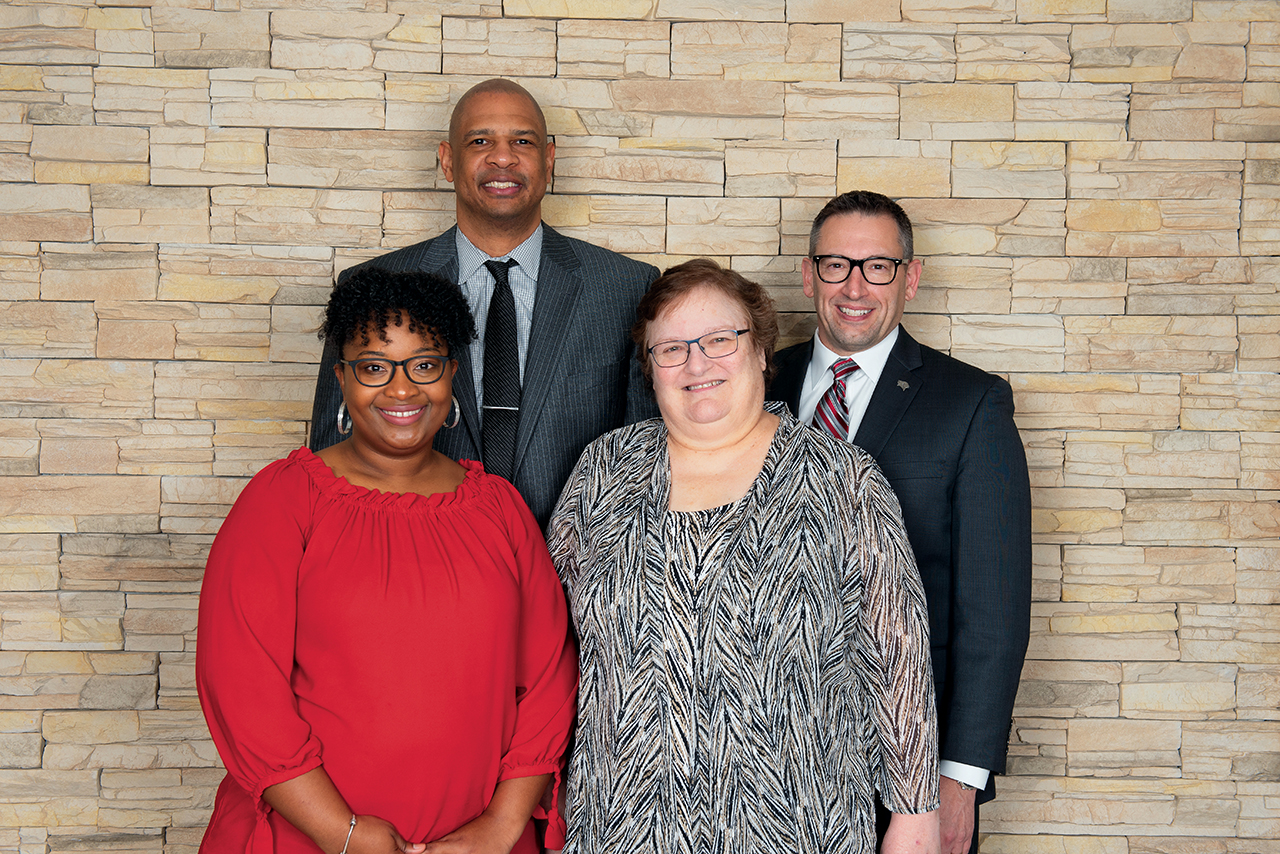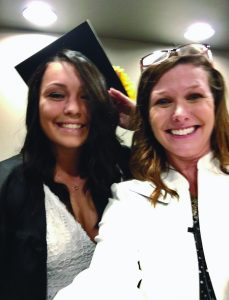Every Tuesday afternoon during the academic year a group of administrators and staff gather for what is one of the most confidential conversations held on campus. Secluded in a conference room in the Student Services Building, representatives from at least seven university units discuss students who are dealing with a mental health issue.
In what is the epitome of Illinois State’s commitment to individualized attention, the group reviews by name and specific circumstances the situation of each student. Those seated at the table contribute to conversation about students facing circumstances that range from sinking depression and crippling anxiety to suicidal ideations or attempts.
Each provides input tied to their specialty, be it through Housing, Student Access and Accommodation Services, the ISU Police Department, academic support provided within University College, Financial Aid, or legal counsel. Staff from Counseling Services and Health Services, who are bound by confidentiality, contribute as consultants.
Appears In“We address the needs of the whole student, which isn’t the case at every university,” said Dr. Sandy Colbs, Student Counseling Services director. “Our outreach is prevention focused and based on the reality that mental health struggles are part of being human.” The evidence of this truth exists on all college campuses, as higher education overall faces the dilemma of how to handle escalating student mental health needs.
The American Council on Education reported in 2019 that a mental health crisis at U.S. colleges and universities is worsening. There is consequently increased and unmet need among students in a population at risk, as documented by the National Institute of Mental Health. It confirms that suicide is the second leading cause of death among college students. The National Alliance on Mental Illness has published an equally startling statistic: One in four college students has a diagnosable mental illness.
Colbs has witnessed the increased need for mental health programs and outreach during her 19 years directing ISU’s counseling services, which is confidential and without cost for enrolled students. She reports that the national demand for campus mental health care has jumped 30 percent in the past decade, while enrollment has climbed less than 6 percent. “It’s not that we have more students, but rather a dramatic increase in the number that have received previous treatment and come to campus with a diagnosis,” said Colbs, who has seen the statistic of students seeking help at ISU triple since she arrived in 2001.
“We get eye-to-eye and face-to-face and address issues with students before they escalate. We can’t stop everything from happening, but the vast majority of the students we encounter who are suffering or in distress go on to graduate and are successful.”
She estimates the office serves approximately 9 percent of the student body that totaled 20,878 at the start of the academic year. The number helped climbs higher when adding in students who seek aid in other offices that partner to create the University’s mental health safety network. Included are staff who serve on the Redbird Care Team that meets weekly. They intervene when students display unhealthy or dangerous behaviors that are reported by faculty, staff, or peers, or are revealed when the person seeks self-help.
Some cases emerge through the University’s Critical Incident Response Team. Other students seek out residence hall staff or the Dean on Duty, an administrator ready to be a resource for any enrolled who are facing an emergency, overwhelmed by an academic or personal issue, or just needing guidance in dealing with a campus situation that ranges from paying a parking ticket to challenging a grade.
Staff partner to strategize plans that meet each student’s individual needs—from communicating on their behalf with faculty about upcoming assignments or absences to being a liaison with family members. Students always ultimately decide their goals, with staff facilitating the steps to reach each one through an after-care plan that ranges from ongoing counseling sessions to putting their studies on hold.
The team also discusses progress made as students flourish after receiving support orchestrated through the Division of Student Affairs, which stands ready to help Redbirds grappling with everything from homesickness and sexual identity to test anxiety, family or financial crises, and psychotic breakdowns.
“We just want to make certain students are aware of all that is available for them,” said Dr. John Davenport, Ph.D. ’15, who is ISU’s dean of students. He describes his office as the pipeline for support across campus. He is proud of the University’s care team structure and stellar resources in place. For example, in 2019 Student Counseling Services received the Excellence in Group Practice Award from the American Psychological Association.
Beyond group sessions, Student Counseling Services and Student Health Services partner to offer individual therapy appointments, psychiatric care, and a 24-hour crisis hotline. There is an eating concerns assessment and treatment team, as well as a relaxation room. Ongoing outreach programs range from sexual assault and relationship violence to The Body Project that focuses on positive self-image, and wellness classes that teach self-care.
There are also off-campus referrals that are needed because Student Counseling Services often has a wait-list as early as a month into the fall semester—another indicator of the fact students come to college burdened.
“I have been in this profession for 25 years and can tell you that the things we deal with now weren’t issues we faced 15 years ago,” Davenport said, giving as an example the fact students exhibit high levels of anxiety beginning on move-in day. “Students are passionate and come to college under pressure. The things they have experienced in high school are heavy.”
Davenport attributes the change in part to the fact today’s college generation is over scheduled, pressured to excel in a broad range of activities, and is in large part successful. This is especially true academically at ISU, which maintains high admissions standards.
“More and more we have students enroll who have never failed. It is jarring for them when a grade drops or a professor is critical of an assignment,” Davenport said of the cohort that has grown up in the tumultuous post-9/11 world. They also represent a population that has relied heavily on technology to build relationships through social media, which Davenport describes as a two-edged sword.
“We all post our best life,” he said, which creates a false sense that others are thriving. He counters that perception with the example of students living on the same residence hall floor going through a similar tough experience but unaware of the other’s burden.
While some of the difficulties surface for a student while at ISU, the reality is that more are arriving with special needs documented through an IEP (Individualized Education Program) or with a diagnosis that requires ongoing medication and counseling. As a result, ISU Police Chief Aaron Woodruff and his officers regularly handle calls for a wellness check, intervene when students are at risk of harming themselves or others, and handle transports to local hospitals when necessary.
Police also deal with increased instances of students self-medicating. Woodruff reveals that drugs such as Adderall or Xanax that have been prescribed to stabilize a student’s mental health are increasingly being used by peers who have emotional pain. Regardless of what the one who is hurting faces, ISU’s solution always begins with individual attention from skilled staff in units across campus.
“My job is to help students get started on a path forward from whatever their issue may be, whether it’s time management or questioning why they are living. The focus is always on the positive and proactive, with the objective of helping students avoid their crisis mode again.”
“Every single officer is crisis intervention team certified,” said Woodruff, who has led the department for eight years. The addition of a therapy dog has become a positive force as officers work one-on-one with students in crisis. He attributes the rising demand for such services in part to the fact there is less stigma tied to individuals wrestling with mental health issues.
There are student groups on campus that make it easier for peers to reach out for help, including To Write Love on Her Arms, and Students Ending Mental Illness Stigmas. The Student Government Association worked with communication majors to create a YouTube video that encourages students to seek help.
Student Affairs does an excellent job of sharing with incoming students and their families in Preview sessions each summer what mental health services are available. Faculty and staff receive a mailing at the start of each academic year with information about warning signs, services available, and how to make a referral.
The end result is that Illinois State does indeed work like a small private college. “We get eye-to-eye and face-to-face and address issues with students before they escalate,” Woodruff said. “We can’t stop everything from happening, but the vast majority of the students we encounter who are suffering or in distress go on to graduate and are successful.”

That fact is confirmed by Dean of Students Office Case Manager Coordinator Quanisha Kumi-Darfour ’06. Her focus is on serving the nearly 13,000 students living off campus, while a peer fills the same position for the residence halls. The case manager’s role is to help students solve problems in a practical way that empowers them and holds them accountable for their own progress. Listening is essential, as is providing information about resources and lifting up students to think critically, engage in self-care, and learn to self-advocate.
“I am a source of encouragement. I tell students that what they are going through is normal, that they are not alone, and that we all need somebody. I help them build a resiliency,” said Kumi-Darfour, who typically has a case load of more than 100 students at any given time.
“My job is to help students get started on a path forward from whatever their issue may be, whether it’s time management or questioning why they are living. The focus is always on the positive and proactive, with the objective of helping students avoid their crisis mode again,” said Kumi-Darfour, who delights in celebrating at commencement with the same individuals she guided through a valley.
“Most of the students we work with end up feeling better and are responsive to care,” said Colbs, who issues the reminder that the majority of ISU students are doing well without the need for intervention. For those who do need a helping hand, the University is ready, willing, and able to provide services that result in a success story for the campus overall.
“Our team members are right in step with best practices,” said Davenport, who can cite myriad examples of students still connected to the staff members who provided guidance through a dark period.
Each story exemplifies the University’s core value of individualized attention in action, a commitment that results in one unchanging reality Davenport speaks without hesitation: “Our students know there is someone on campus who cares about them.”
The power of personal attention
Many students who seek help at ISU are dealing with an issue that does not fall into the category of a mental illness, but rather an emotional circumstance so overwhelming it is difficult to function. Such was the case for Kayla McFarland, who knew at the start of her junior year that her struggle was crippling.
“I had stopped going to class and was giving up. What I wanted to do was not participate in anything,” recalled McFarland, who began that fall semester in August 2016 just four days after the funeral of her mother, Patricia. “I knew the first day of classes that I was not going to be the student I was the year before.”
McFarland was actively engaged at her South Elgin High School, where she was captain of the gymnastics team and helped organize extracurricular events. To minimize loans, she took waitress jobs while earning her diploma. As a student in communication at ISU, she worked at TV-10 and as a morning DJ on WZND. During her sophomore year she began serving at Olive Garden in Bloomington, but opted to be home the following summer when her mother became critically ill with cancer.
“She got really sick. It seemed one day she was fine, and the next we got the prognosis that she would live four to six months,” McFarland said. “It was so hard because we were very close.”
Her heart was so broken that one day she walked into the Dean of Students Office in tears. Associate Dean of Students Jill Benson was the Dean on Duty that day. “She listened, and I knew she was because she welled up with tears when I shared my story,” McFarland recalled. “I knew then that she really did care.”
Together the two developed a plan for McFarland to deal with her grief through therapy and open communication with her professors. Benson helped arrange assistance through Student Access and Accommodation Services, which allows students to take mental health days when situations make it impossible for them to cope with the academic load.
McFarland made the decision to remain enrolled and work through her darkest days, doing so with Benson as her confidant and mentor. “She was able to guide me in the direction I needed to go. She took me under her wing,” McFarland said.
It’s consequently no surprise the two remain in touch despite McFarland living in Chicago and working as a business development representative at Groupon. She keeps on her cell phone a photo she captured, above, of Benson and herself at graduation ceremonies that McFarland attended in May 2018.
Crossing the stage was a moment of celebration for both ladies, and a special opportunity for McFarland to acknowledge her love for her mother. Patricia’s presence and memory were apparent through the words McFarland added to her mortar board: “I Did It Momma!”


